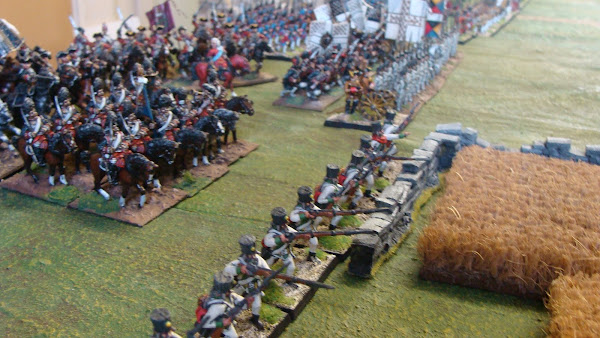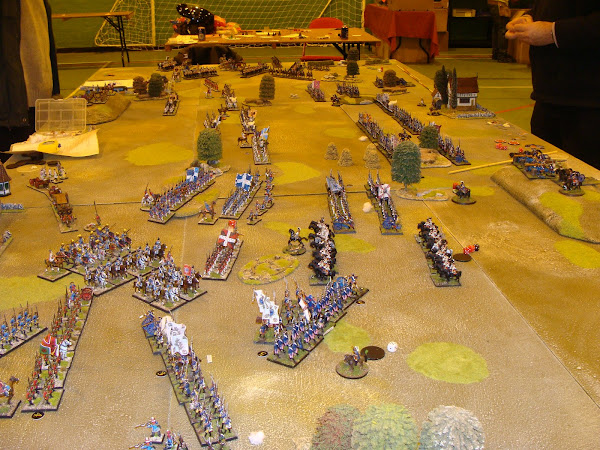In Issue 26 of Battlegames David Brown wrote a very interesting article regarding the plethora of modern rules that have a fixation with speed. I found the article thought provoking especially as my sloth like brain had been pondering the modern rule writers fixation with taking away the thought processes of wargamers and replacing them with something else,.
David Brown also hit the nail on the head about the lack of written orders and their replacement by a dice induced mega move.
Which little preamble leads me onto last weeks game.
John and I attended Colin's for a SYW game [ Blog; Carry on up the Dale], Russians v Prussians.
The idea was to stage a battle using The Arguement of Kings. Now I have played Blackpowder since their release and truthfully find them playable and usually they make for a decent nights entertainment.
But the game didnt sit easy with me. Initially I thought it was to do with me losing the game,but I normally take losing almost as a given nowadays.
I think what it was however was the mechanisms that the rules use.
Firstly I was in charge of the Russians, whose commanders werent the best, just average. The troops under their command were however acceptable and imbibed with slavic stubborness.
I was however facing a fairly more nimble foe, led by far better commanders. Additionally the Prussians were classed as trained, veteran or Elite.
The game however seemed balanced,as I did have slightly more units.
My first gripe was Colin throwing a very low score on his dice which enabled him on move one to march right up to my first russian line. Under the new rules,this was offset by his inability to fire aftersuch a move.
Right I thought, lets see how the Prussians handle close range, and first volley fire from two large units.
The result was quite easily really. A hand full of saving throws and a little bit of luck and the Prussian first line was unscathed.
On the other flank John had managed to throw such a high throw that he couldnt move his units, well apart from those in march columns. Very un prussian like. This was to continue for most of the night for John.
Next Prussian move I had to face a close range Prussian volley, not nice to say the least.You can guess the effect on my average troops. Due to their stubborness they managed to hang about, but after a second ineffectual volley, I realised that I was better off just charging in,which I did. Not exactly how I understood the SYW to have actually been. It didnt matter my Russians just got shredded. When John finally got moving my right wing was already in complete disarray, and the Prussians by another decent dice throw had turned my flank while I had to stand and watch. By the end of the night, I had only three regiments left and two brigades fleeing. The roll call for the Prussians was the loss of half a unit of skirmishers, and ONE figure casuality on the right wing.
My gripe, it just didnt feel right. Now its a bad trademan who blames his tools, but it got me thinking; what if the Prussians had been facing my Austrians. They dont have stubborness so on move two they would have ran from the board.
Historically right,I dont think so.
If the Prussians had been that good, how come it was called the Seven Years war. Lets be right Frederick was lucky to hang on as he did, only poor generalship allowed him off the hook, not super troops.
I intend to expand on this thought. The game itself was nice to look at, spoiled by something that is becoming a trend in wargaming, speed at the expense of accuracy.

The Independent Wargames Group. Being a Journal of views, prejudices, ideas and photographs of wargaming not just nationwide, but hopefully world wide. The name IWG was adopted in the early 1980's in response to the then dominant Wargames Research Group, but things have moved on, and wargaming appears to be in somewhat of a Golden Age, so sit back and hopefully enjoy my rantings.
Subscribe to:
Post Comments (Atom)
My 6mm Napoleonic set up.

Austria 1809.
Austrian Hussars

Hinchliffe figures
Austrian Grenzer

Austrian Grenzer
Smoggycon 2013

Smoggycon 2013
Smoggycon 2012

Smoggycon 2012
Smoogycon 2009

My French getting another beating
I think that you were had. The Prussian armies that faced the Russians in the East were generally of a poorer quality than those led by the King himself. Gross Jagersdorf and Paltzig/Kay are good examples of the average-ness of the Prussians that were not led by Fritz in person.
ReplyDeleteFritz' own tilts with the Russians at Zorndorf and Kunersdorf did not have happy endings for the boys in blue either. So I would downgrade all Prussians facing the Russians or upgrade the Russians to veteran. No elites in this theatre of the war.
Finally, it seems that you were the victim of bad dice rolling. I guess that it happens.
I don't like rules where moving and firing are taken out of the players' hands and depend on a particular die roll. Maybe it's ok if you want to get your brigade moving the first time, but once they are within say 12 inches of the enemy battle line, I find it incredulous that the defender would decide not to fire when the opportunity came around.
Fritz
Not quite how I remember it, ie with one exception all the Prusians were pretty well shot up, shaken and or disordered. Nor were they all elite super troops in the game or in real life althougha significant proportion of the Prussians at Zorndorf where guard or grenadiers. Buy why bother? It was a game with toy soldiers using a rules we've used before that actually got us a result which to my mums is better than what you get with other more ponderous or pedestrian rules claiming to have the real feel of the period...not.
ReplyDelete....to my mind, not my mums!
ReplyDeleteI've recently played my first game using BP- details will appear on my blog when I get back from Derby. But in short I'm even less impressed than I was before I played. Just working through the guff and twaddle to FIND the bits you need is a major pain inthe ..
ReplyDeleteMinden is a good example of a well trained force not moving even though the friends nearby were doing very well.
ReplyDeleteThat Prussian refusing wing is not unknown :)
Any rules that restrict movement by way of a deliberate constraint can be frustrating. Far better allow the complete freedom to make your own contraints. Movement & firepower; cover & line of sight; orders - their writing, dispatch & reciept; finally, the morale & training of the troops; these are the important elements. Many early sets of rules cover all these aspects perfectly adequately, Don Featherstone's early rules from 'The Wargame' have done for me for over 40 years now.
ReplyDeleteIt remains a subject of some fascination to me how both my opponents and I fail to send the correct orders to our brigades or regiments in a timely fashion and then suffer the consequences. No rules or contrived mechanisms to blame, only ourselves. Great fun & often quite tense.